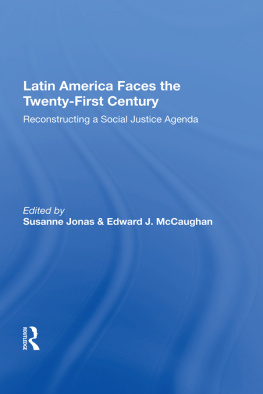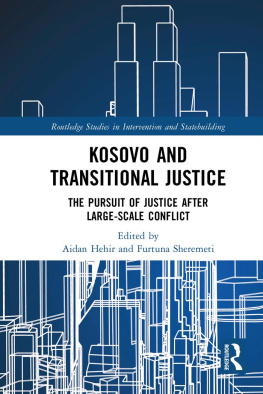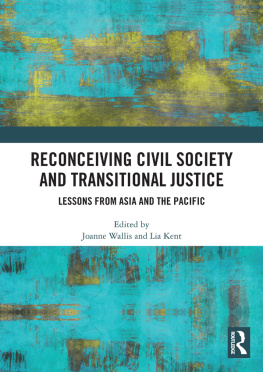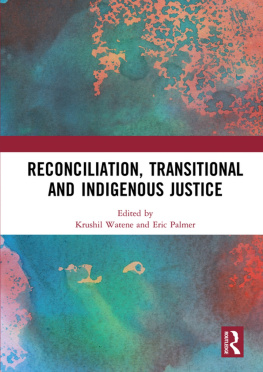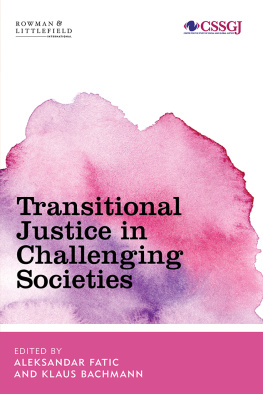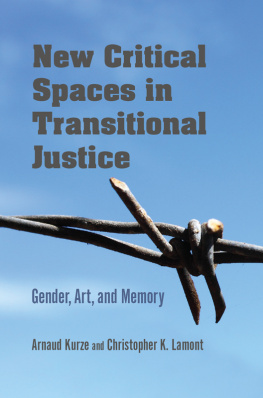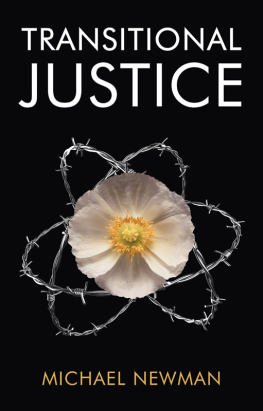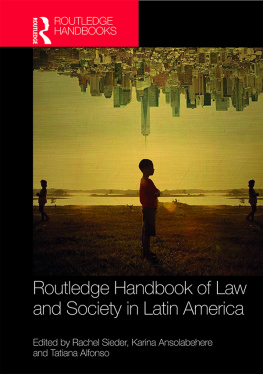Finally a book convincingly and empirically demonstrates that Latin America serves as a model on how to best deal with human rights abuses from the past. an original, sophisticated and nuanced interpretation.
Ariel Dulitzky, University of Texas School of Law/UN Working Group on Enforced Disappearances, USA
The editors take on one of the key challenges in writing about transitional justice: establishing valid systematic comparisons without losing the context and particularity of each countrys process. will add greatly to theoretical and practical discussions on the direction and future of transitional (and post-transitional) justice.
Naomi Roht-Arriaza, University of California, Hastings College of Law, USA
This book presents the most ambitious and systematic attempt yet to provide an in-depth comparative analysis of transitional justice processes an important step in shaping the development of empirical research in the transitional justice field.
Hugo van der Merwe, Centre for the Study of Violence and Reconciliation, Cape Town, South Africa
A great contribution for our understanding of transitional justice in Latin America. It combines systematic comparative analysis with qualitative case studies and historical sequencing with synchronic assessments of policy outcomes. The challenge was great but the authors clearly succeeded!!!!
Catalina Smulovitz, Universidad Torcuato Di Tella, Argentina
The editors usefully establish a common framework with which to more systematically analyze the rich qualitative data collected by an impressive roster of country specialists. Some innovative data visualizations are used to illustrate outcomes in particular cases, and also to facilitate cross-national comparison across space and time.
Eric Wiebelhaus-Brahm, University of Arkansas at Little Rock, USA
Transitional Justice in Latin America
This book addresses current developments in transitional justice in Latin America effectively the first region to undergo concentrated transitional justice experiences in modern times. Using a comparative approach, it examines trajectories in truth, justice, reparations, and amnesties in countries emerging from periods of massive violations of human rights and humanitarian law. The book analyses the cases of Argentina, Brazil, Chile, Colombia, Guatemala, El Salvador, Paraguay, Peru, and Uruguay, developing and applying a common analytical framework to provide a systematic, qualitative, and comparative analysis of their transitional justice experiences. More specifically, the book investigates to what extent there has been a shift from impunity towards accountability for past human rights violations in Latin America. Using thick, but structured, narratives which allow patterns to emerge, rather than being imposed the book assesses how the quality, timing, and sequencing of transitional justice mechanisms, along with the context in which they appear, have mattered for the nature and impact of transitional justice processes in the region. Offering a new approach to assessing transitional justice, and challenging many assumptions in the established literature, this book will be of enormous benefit to scholars and others working in this area.
Elin Skaar is at the Chr. Michelsen Institute, Bergen, Norway.
Jemima Garca-Godos is at the Department of Sociology and Human Geography, University of Oslo, Norway.
Cath Collins is at the Transitional Justice Institute, Ulster University, Northern Ireland, and Universidad Diego Portales, Chile.
Transitional Justice
Series Editor: Kieran McEvoy
Queens University Belfast
The study of justice in transition has emerged as one of the most diverse and intellectually exciting developments in the social sciences. From its origins in human rights activism and comparative political science, the field is increasingly characterised by its geographic and disciplinary breadth. This series aims to publish the most innovative scholarship from a range of disciplines working on transitional justice-related topics, including law, sociology, criminology, psychology, anthropology, political science, development studies, and international relations.
Titles in this series:
Transitional Justice, Judicial Accountability and the Rule of Law
Hakeem O. Yusuf (2010)
The Era of Transitional Justice
The Aftermath of the Truth and Reconciliation Commission in South Africa and Beyond
Paul Gready (2010)
The Dynamics of Transitional Justice
International Models and Local Realities in East Timor
Lia Kent (2012)
Gender Politics in Transitional Justice
Catherine ORourke (2013)
Identity, Reconciliation and Transitional Justice
Overcoming Intractability in Divided Societies
Nevin T. Aiken (2013)
Corporate Accountability in the Context of Transitional Justice
Sabine Michalowski (2013)
Families of the Missing
A Test for Contemporary Approaches to Transitional Justice
Simon Robins (2013)
Transitional Justice Theories
Edited by Susanne Buckley-Zistel, Teresa Koloma Beck, Christian Braun, and Friederike Mieth (2014)
Truth, Denial and Transition
The Contested Past in Northern Ireland
Cheryl Lawther (2014)
Transitional Justice and the Arab Spring
Edited by Kirsten Fisher and Robert Stewart (2014)
The Art of Post-Dictatorship
Ethics and Aesthetics in Transitional Argentina
Vikki Bell (2014)
International Trials and Reconciliation
Assessing the Impact of the International Criminal Tribunal for the Former Yugoslavia
Janine Clark (2014)
The Concept of the Civilian
Legal Recognition, Adjudication and the Trials of International Criminal Justice
Claire Garbett (2014)
After Violence
Transitional Justice, Peace and Democracy
Elin Skaar, Camila Gianella, and Trine Eide (2015)
Transitional Justice and Reconciliation
Lessons from the Balkans
Edited by Martina Fischer and Olivera Simic (2016)
Forthcoming titles in the series:
The Judiciary and the Politics of Transition
Police Brutality Cases in Chile, Northern Ireland and South Africa
Marny Requa
The Trouble with Truth
Dealing with the Past in Northern Ireland
Kieran McEvoy
Violence, Law and the Impossibility of Transitional Justice
Catherine Turner
Transitional Justice in Latin America
The uneven road from impunity towards accountability
Edited by
Elin Skaar, Jemima Garca-Godos and Cath Collins

First published 2016
by Routledge
2 Park Square, Milton Park, Abingdon, Oxon, OX14 4RN
and by Routledge
711 Third Avenue, New York, NY 10017
a GlassHouse book
Routledge is an imprint of the Taylor & Francis Group, an informa business
2016 Editorial matter and selection, Elin Skaar, Jemima Garca-Godos and Cath Collins; individual chapters, the contributors
The right of Elin Skaar, Jemima Garca-Godos and Cath Collins to be identified as editors of this work has been asserted by them in accordance with sections 77 and 78 of the Copyright, Designs and Patents Act 1988.


